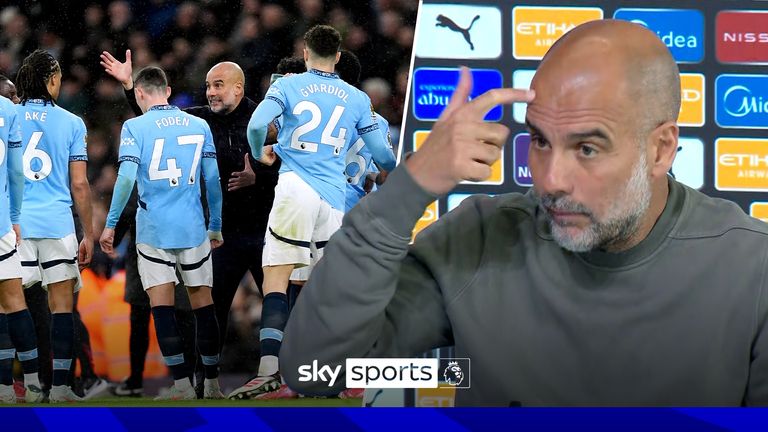Man City defender secures move to Champions League club

Manchester City’s promising young defender Juma Bah has secured another pivotal loan move, this time to French club OGC Nice for the 2025/26 season. The 19-year-old Sierra Leonean center-back’s journey represents one of modern football’s most intriguing development stories, showcasing how elite clubs navigate the delicate balance between nurturing young talent and managing competitive squads.
The Decision-Making Process
Bah’s move to Nice wasn’t made in haste. The teenager had multiple options on the table, with Olympique Lyonnais emerging as serious contenders for his signature. Representatives from Lyon traveled to Manchester City’s Etihad Stadium last week for detailed discussions about a potential loan arrangement. However, after careful consideration involving his representatives, Manchester City’s coaching staff, and the player himself, the allure of the French Riviera and Nice’s project proved too compelling to resist.
The decision-making process highlighted the sophisticated approach modern football clubs take when planning young players’ development paths. Nice’s offer provided several advantages that ultimately swayed Bah’s decision. The club’s recent fourth-place finish in Ligue 1 has earned them a spot in the Champions League third qualifying round, offering Bah the tantalizing prospect of European competition at the highest level. This opportunity to play on football’s grandest stage represents a significant step up from his previous loan experience at RC Lens.
The Nice Project Under Franck Haise
Nice’s appointment of Franck Haise as manager has injected fresh optimism into the club’s ambitious project. Haise, who previously guided Lens to impressive heights in Ligue 1, brings a reputation for developing young talent and implementing an attractive, progressive style of play. His tactical acumen and ability to maximize players’ potential make him an ideal mentor for Bah’s continued development.
The manager’s philosophy aligns perfectly with Bah’s playing style. Known for his composure on the ball, aerial ability, and mature reading of the game, Bah possesses the technical and mental attributes that Haise values in his defensive setups. The prospect of working under a coach who has successfully managed top-flight French football while maintaining a focus on youth development represents an invaluable opportunity for the young defender.
Nice’s European ambitions add another layer of excitement to Bah’s loan move. The club must navigate two qualifying rounds to reach the Champions League group stage, but their domestic form suggests they have the quality to achieve this objective. For Bah, the possibility of Champions League football at just 19 years old would represent a remarkable achievement and provide invaluable experience that could accelerate his development trajectory.
Reflecting on the Lens Experience
Bah’s loan spell at Lens during the second half of the 2024/25 season provided crucial insights into his capabilities and areas for improvement. He effectively replaced Abdukodir Khusanov in Lens’s defensive setup, a testament to his adaptability and quality. Khusanov’s subsequent move to Manchester City created an interesting dynamic, with Bah essentially stepping into the shoes of a player who had earned a permanent move to one of Europe’s elite clubs.
During his time at Lens, Bah demonstrated maturity beyond his years. French football’s physicality and tactical sophistication provided an ideal testing ground for his abilities. He adapted quickly to Ligue 1’s demands, showing impressive consistency in his performances and earning praise from coaches and teammates alike. His aerial dominance, crucial in French football’s physical battles, became a significant asset for Lens’s defensive stability.
The loan experience also highlighted areas where Bah could continue improving. His distribution from deep positions showed promise but required refinement to meet the exacting standards expected at elite levels. His positioning in defensive transitions occasionally needed adjustment, particularly when dealing with pacey attackers exploiting space behind the defensive line. These learning experiences at Lens have undoubtedly prepared him for the challenges he’ll face at Nice.
The Controversial Manchester City Transfer
Bah’s arrival at Manchester City in January generated significant controversy, particularly regarding the circumstances surrounding his departure from Real Valladolid. The Spanish club expressed frustration with how negotiations were conducted, claiming they were deprived of a larger transfer fee due to the manner in which the deal was structured. This controversy highlighted the complex nature of modern football transfers, where player development, commercial interests, and sporting ambitions often create conflicting pressures.
Despite the controversy, Manchester City’s acquisition of Bah represented a calculated investment in future potential. The club’s scouting network had identified him as one of Europe’s most promising young defenders, possessing the physical and technical attributes necessary to succeed at the highest level. His performances in Spain’s Segunda División had caught the attention of multiple European clubs, but City’s offer and development pathway ultimately proved decisive.
The transfer saga also demonstrated the challenges smaller clubs face in retaining their best young talents. Valladolid’s frustration was understandable, as losing a player of Bah’s potential without maximizing financial compensation could significantly impact their own development projects. However, for the player himself, the opportunity to join Manchester City’s academy and development system represented a chance to accelerate his career progression.
Manchester City’s Squad Management Challenge
Bah’s loan move to Nice reflects Manchester City’s broader squad management challenges as they prepare for the upcoming season. The club’s recent acquisitions, including the permanent signing of Khusanov and the addition of Brazilian prospect Vitor Reis, have created increased competition for defensive positions. This depth, while beneficial for the club’s competitive ambitions, necessitates careful planning to ensure all players receive adequate development opportunities.
Pep Guardiola’s recent comments about having “too many players” underscore the delicate balancing act elite clubs must perform. The manager acknowledged that several players might need to move on loan or permanently to ensure squad harmony and provide development opportunities. This approach reflects modern football’s evolution, where clubs must manage large squads while maintaining competitive balance and player satisfaction.
The presence of Khusanov and Reis in City’s defensive ranks made Bah’s inclusion in the first-team squad unlikely for the immediate future. Rather than allow a promising talent to stagnate, the club’s decision to facilitate another loan move demonstrates their commitment to his long-term development. This approach has served City well in the past, with several players benefiting from loan experiences before establishing themselves in the first team.
The Development Pathway Philosophy
Manchester City’s approach to Bah’s development reflects a sophisticated understanding of player progression in modern football. The club recognizes that regular first-team football at an appropriate level often provides more valuable experience than sporadic appearances for a top-tier team. By securing a loan move to Nice, City ensures Bah continues facing senior-level competition while potentially experiencing European football for the first time.
This development philosophy has produced remarkable results for City in recent years. Players like Phil Foden, Cole Palmer (before his Chelsea move), and others have benefited from carefully planned development pathways that balanced first-team opportunities with loan experiences. The club’s track record in youth development provides confidence that Bah’s career trajectory is being managed with his long-term interests in mind.
The loan system also allows City to maintain relationships with clubs across Europe, creating valuable networks for future transfers and collaborations. Nice’s willingness to provide Bah with opportunities reflects their confidence in his abilities and their commitment to developing young talent. These relationships often prove mutually beneficial, with loaning clubs gaining access to promising players while receiving clubs benefit from temporary additions to their squads.
European Competition Prospects
The possibility of Champions League football represents the most exciting aspect of Bah’s move to Nice. European competition at the highest level would provide invaluable experience for a player still in the early stages of his career. The tactical sophistication, increased intensity, and global spotlight of Champions League football could accelerate his development significantly.
Nice’s qualification pathway requires navigating two challenging rounds, but their domestic form suggests they possess the quality necessary to reach the group stage. The club’s fourth-place finish in Ligue 1 demonstrated consistency and competitiveness against established French football powers. Their defensive solidity, which Bah could significantly contribute to, will be crucial in their European qualification attempts.
Should Nice successfully qualify for the Champions League group stage, Bah would join an elite group of teenagers who have experienced Europe’s premier competition. This experience could prove transformative for his career prospects, providing exposure to different tactical approaches, varying playing styles, and the pressure that accompanies football’s biggest stage. The confidence gained from such experiences often proves invaluable for young players’ long-term development.
The Broader Context of Youth Development
Bah’s story reflects broader trends in modern football’s approach to youth development. Elite clubs increasingly view loan systems as essential components of player progression, recognizing that artificial development timelines often prove counterproductive. The willingness to invest time and resources in carefully planned development pathways demonstrates football’s evolution toward more sophisticated talent management.
The global nature of Bah’s journey also highlights football’s increasing internationalization. A Sierra Leonean player moving from Spain to England before being loaned to France represents the sport’s ability to transcend geographical boundaries in pursuit of talent development. This international experience provides players with cultural adaptability and tactical versatility that proves invaluable throughout their careers.
Manchester City’s investment in players like Bah also reflects their commitment to sustainable success. Rather than relying solely on expensive transfers, the club continues developing young talent who could contribute to future squads. This approach balances immediate competitive needs with long-term strategic planning, ensuring continued success across multiple seasons.
Looking Ahead: Expectations and Challenges
As Bah prepares for his Nice adventure, several factors will determine the loan’s success. Adapting to a new tactical system under Franck Haise will require flexibility and dedication. The manager’s emphasis on possession-based football and high defensive lines could challenge Bah to expand his comfort zone and develop new aspects of his game.
The cultural adjustment to life on the French Riviera presents both opportunities and challenges. Nice’s multicultural environment and strong international presence should ease his transition, while the city’s quality of life and football culture provide an ideal setting for professional development. The chance to learn French and experience Mediterranean culture adds valuable personal development to his football education.
Competition for places at Nice will be fierce, requiring Bah to maintain the high standards he established at Lens. The club’s European ambitions mean every position will be contested, pushing him to continue improving all aspects of his game. This competitive environment should accelerate his development while preparing him for similar challenges throughout his career.
The loan arrangement also includes performance benchmarks and development targets that will influence his future pathway. Regular communication between Nice, Manchester City, and Bah’s representatives ensures all parties remain aligned on expectations and objectives. This collaborative approach maximizes the loan’s potential benefits while maintaining focus on long-term career development.
Conclusion: A Strategic Move for All Parties
Juma Bah’s loan move to Nice represents a strategic decision that benefits all involved parties. For the player, it provides continued development opportunities, potential European experience, and exposure to new tactical approaches. Manchester City maintains oversight of a promising prospect while managing squad size and providing valuable experience. Nice gains access to a talented young defender who could contribute significantly to their domestic and European ambitions.
The move demonstrates the sophistication of modern football’s development systems, where multiple stakeholders collaborate to optimize young players’ career trajectories. As Bah prepares for pre-season training with his new teammates, the foundations are being laid for what could prove to be a transformative season in his young career.
Success at Nice could position Bah for an eventual return to Manchester City’s first team or facilitate a permanent move to another elite European club. Regardless of the specific outcome, the experience gained through this carefully planned loan arrangement will undoubtedly contribute to his long-term development as both a player and a person. The French Riviera awaits a young defender ready to take the next significant step in his promising career.















